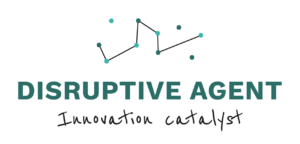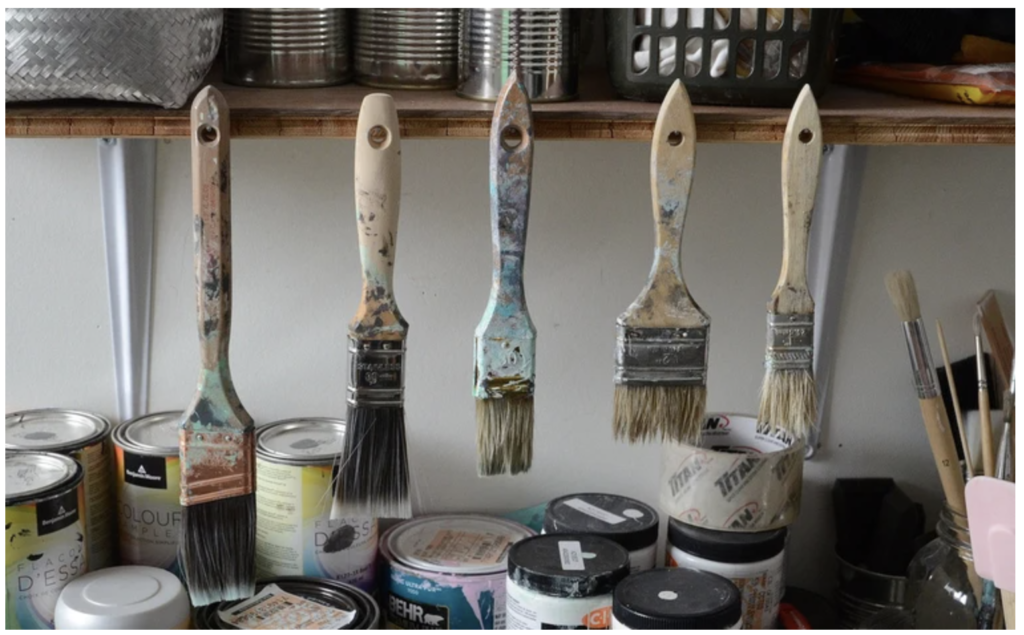I generally write about how to innovate a business model or a company culture. Today, I’m sharing the 6 lessons learned when I became a solopreneur for the first time. These lessons transformed me as an entrepreneur, as a business woman and as an innovation consultant.
Clear vision, insufficient business savvy
When I landed in Montréal, Canada, in 2010, I was an expat with a corporate job I enjoyed. I had been working in the innovation methodology department of a major video game company for a few years and I loved innovation subjects. Two years later, I took a sabbatical to start my own company. It was my first endeavor in the entrepreneurial world and I was feeling quite nervous.

I had a clear vision for my future company from the get-go. I would rejuvenate vintage pieces of furniture with a contemporary European design touch and create home decor objects mixing vintage and new, all handmade in Montréal. The brief to design my logo was easy to create : I saw it very clearly in my mind.
As I was running all over town to find a workshop, I wasn’t really thinking about my business model. I didn’t know the concepts at the time. I would discover Lean Startup a few months later, after Eric Ries wrote his famous book in 2011.
After I learned the essential skills of woodwork machinery, I got a membership in a professional carpentry workshop. I started scouting the first pieces of furniture that would start my business. My blog was full of articles that never contained a call to action or converted a reader into a client. I set up an Etsy shop, participated in pop-up stores and fairs across the Quebec region, and found my first clients (friends, to begin with).
Once I felt more comfortable as an entrepreneur, I started adding more products. I discovered cement work with a friend and I loooooved it. I complemented my offer with services: a training program for furniture renovation, various creative workshops… In parallel I was expanding my range of distribution points.
And there, just as “scale up” was happening, as more shops wanted to distribute more of my products, when my brand started to be recognized locally here and there, I reached a limit.
My first entrepreneur dilemma: persevere, pivot or kill ?
I was at a crossroad: I had to decide between 3 options. Option 1 was to continue producing handmade quality products at an unprofitable price point (I hadn’t been very astute in establishing my pricing strategy when I started). The second option was to subcontract some products to a nearby cement factory that would produce more products faster for a lesser cost. I also considered option 3, pivoting to a high-end product line that would sell less pieces at a higher price point.
Option 1 had proven tiring and unsustainable, option 2 was too far from the vision I had set when establishing my business. Option 3 meant to find a second wind which was hard for me mobilizing at the time.
After a few weeks of questioning, I decided to stay true to my original vision. Since it was irreconcilable with a profitable business model, I closed shop and pulled the plug on my company. I felt at peace with my decision. At that time, my vision was paramount to me and felt more important than my ability to generate repeatable & profitable business.
6 lessons I learned from failing my first company
Of all that happened during these 3 years, good and bad, I learned 6 main lessons. They reflect my experience, stem from my personality and of course they don’t work for every entrepreneur.
1- Entrepreneurship is exhilarating
Despite the hard work, the long hours, the doubts, the (multiple!) failures, the lack of sales, of profit, I never, not one single day, regretted my decision to start my company. As I was scouting vintage pieces, testing new molds for my cement products, learning new technics, even doing my accounting, I felt an enthusiasm that was quite unparalleled compared to my corporate experience. (I felt it again when I resigned from my job to launch my second business. And I feel it today as I relocate Disruptive Agent to Europe).
This is not a lesson learned really, rather a sharing of experience. Being my own boss, making my own decisions, prioritizing what matters for my business, creates a feeling of empowerment that takes precedence over any form of hassle or stress that derives from creating and running a business. For me, that is.
2- Working alone is hard
Despite the excitement, working alone is hard. Not just because I like being around people. It’s hard not to have people to share your concerns, questions, doubts with. It’s hard not being able to ping-pong your strategy with someone exterior to and more distanced from your business. (Note: dumping all this on your significant other is not fair, so I tried not to do it too much).
At the time, we created a group with like-minded entrepreneurs who had the same need to connect and share. We didn’t have the same methods for creating our companies, or the same level of experience. Some were more advanced in their business maturity, some less. But it didn’t matter much because it was rewarding enough on its own. Meeting once a week to work next to one another was compensating for our otherwise lonely working conditions.
3- Build a business, not a hobby

I started my company from a childhood dream, but I built it backwards. I designed and created products before designing a business. After the first clients-friends got sufficiently equipped with my products, time came to face the real business development phase. I tried to apply the models of Lean Startup to my existing company. By then, the weaknesses of my approach had begun to show. I hadn’t made a proper market review of my local customers, I hadn’t done the maths to ensure profitability across my product lines, etc.
When I started my second company, I thought about my business model first. I determined who my ideal clients were, what needs and pains they had, what benefits they wanted to experience. I thought about my value proposition before thinking about precise solutions. Applying the Lean Startup principles, I tested and validated the interest for my services before building too much content. I created my company with a business in mind, not a product.
4- Ask the difficult questions first
Some of us have difficulty talking openly about specific subjects. In the French culture, money is taboo (as opposed to the north American or European cultures for instance). Yet when creating a business, these tricky subjects need to be addressed very early on. In my case: how much am I going to price my products / services? What deadlines for paiement can I accept? How will I remind clients of their outstanding invoices? After how many unpaid invoices do I stop working for a client? And so on. Failing to define a clear policy on the topics that are most difficult for them will lead entrepreneurs into a pitfall, short or mid-term.

When creating a company or a product, don’t shy away from the questions that make you the most uneasy. They often indicate an area where you need to apply more effort than in others. They show you where the room for improvement is. The same process is recommended in the most recent innovation approaches: derisk the riskiest hypotheses first. And the hardest move for an entrepreneur is to test the attractiveness of their product.
First, validate the desirability: will my clients want my product? Second, the viability: how much will they be willing to pay for my product to make it profitable? Then, feasibility: can I deliver my product or service with the level of quality I envision? Do I have the right equipment / partners to deliver sufficient output? And finally, adaptability: can I scale my business? Is it protected against major shifts in trends (market, consumer, legal, etc)?
(Read my article on why entrepreneurs have such a hard time showing their ideas to clients)
5- Prepare to grow
Another key element when designing a business is to prepare for growth. I’ve seen many situations where entrepreneurs had a vision set on their first product or service, but weren’t prepared to deliver at scale. It happened to me too. When orders from decoration shops in Montréal started to pick up, I spent countless hours in my workshop on my cement production, coming home late and dirty, and I overworked myself to honor the growing orders. The level of effort compared to the benefits I derived from it (financial or otherwise) was disproportionate. I learned that not preparing for the next step comes with a cost.
Preparing to grow starts with envisioning your company in, say, 5 years time. Ask yourself from day one, even if things seem remote: where do I want to be after the first years of start-up phase ? Do I want to recruit or subcontract labor? How can I produce at a larger scale, who can help me achieve this growth? Will I be ready to ask for external help when I don’t have time for tasks outside of my core business ?
You don’t have to know all the answers in advance (a lot can happen in the first 5 years, so better keep an open mind), but asking early on the question of scaling can help make better decisions when setting the foundations of your business.
6- Call the experts
For entrepreneurs, the process of creation (of art, pieces, products, services) is the most thrilling activity and is generally why they launch their company. For most, all the rest -finance, administration, business development, etc- are tedious activities that only distracts them from their passion. Unfortunately, these tasks need to be done in order for the company to exist.
Choosing to use professional services from experts is a smart way to save precious time, which can be focused on creation rather than admin tasks. Bonus: they will do it faster and MUCH better than you! Ultimately, they will help you grow and scale when the time comes.
Yes, it’s an investment. You’ll have to decide which, of your time or your money, you are ok to sacrifice. From experience, I witnessed that the shift happens after the company starts generating recurring business.
Today I’m on the experts’ side, helping companies innovate and grow their business. I guide CEOs design and implement the optimal growth strategy for their company, based on business model innovation. And I call experts whenever I need to, to help me accelerate some areas outside my core competencies.
End note
The biggest revelation I experienced when I ventured into entrepreneurship was how much I enjoyed the feeling of freedom and empowerment it brought me. Despite closing my first company, I love working outside of the corporate world.
When I discovered the Lean Startup and Business Model Generation, the methodologies provided such an alignment between my professional experience and my personal vision that I built my next business around them. I have been successfully using these innovation methods as my tools of trade to create solid business models both for my own company and for my clients’ for years now.
If you are interested to learn more about these methods without committing too much time, I give talks or short innovation workshops to curious companies, universities or institutions. Contact me for more information !



